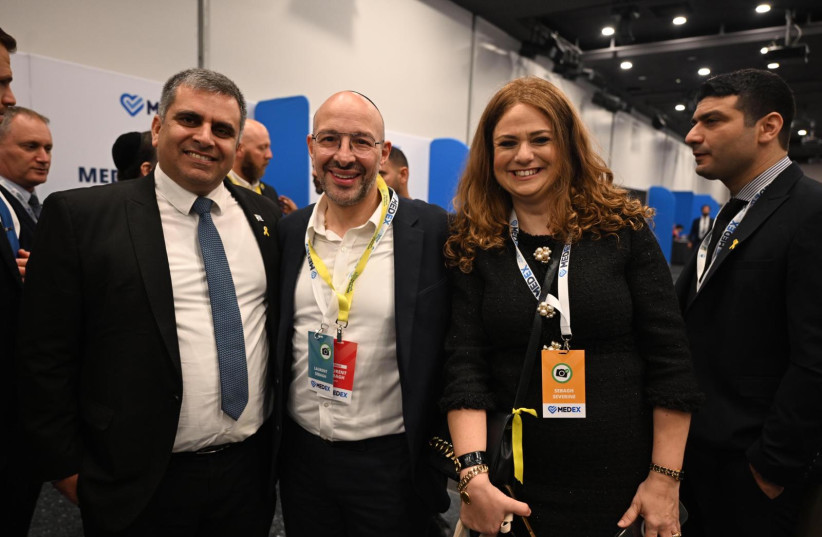PARIS, France — Hundreds of French doctors attended the first European medical aliyah exposition in Paris on Sunday, where they laid the groundwork for their immigration to Israel.
The international medical Aliyah program, a joint project of the Immigration Ministry, Health Ministry, Nefesh B'Nefesh, and the Jewish Agency, guides Jewish doctors in the immigration process and aids them with documents, registration, and accreditation.
At the conference building next to the iconic Eiffel tower, Nefesh B'Nefesh co-founders Tony Gelbart and Rabbi Yehoshua Fass said that the original Medex program that had been initiated and run for the last eight years by NBN was designed to streamline the process for Jewish doctors having trouble navigating Israeli bureaucracy.
Jewish Agency France director Emmanuel Sion told The Jerusalem Post that he wanted attendees to leave the exposition with concrete plans for making aliyah and having all but completed their registration process.
The 450 doctors came on Sunday with documents or filled them out on-site to register their qualifications with the Health Ministry so they could help them figure out what steps would be needed next to transfer qualifications.

Doctors of every field and specialization visited dozens of booths, along with representatives from every major hospital and medical provider in Israel. The spokespeople were keen to explain to prospective immigrants the benefits of working at their institution and discuss how they could ease the process.
A spokesperson from Shaare Zedek Medical Center said they wanted to show the doctors they had a future in Israel. Their institution was home to many immigrant doctors.
"There are many success stories for immigrant doctors," said the Shaare Tzedek spokesperson.
Attendees speak of obstacles along the way
One medical student living in Switzerland, finishing her studies in the summer, wanted to do her residency in Israel. She dreamed of working at the Tel Aviv Sourasky Medical Center. Another medical student still had two more years of medical school, but wanted to research making aliyah in advance. The wife of a doctor attending the conference said that she and her husband had been considering aliyah for a long while and wanted to immigrate before having children, which would make the process more difficult.
Cardiologist and Association des Médecins Israélites de France vice-president Dr. Laurent Sebagh and his wife cardiologist and Institut Cœur Paris Centre director Dr. Séverine Sebagh had previously attempted to make aliyah in the past, but after six months had been stymied by a tedious and arduous process. Sebagh knew other doctors that had wanted to immigrate to Israel, but had stopped due to similar circumstances. With all three of their children in Israel, the cardiologists wanted to try again.
Sebagh said that in the past, doctors had to leave their practice, immigrate, and undertake a six-month unpaid internship while finding the time to learn Hebrew. Under a new system, they didn't have to leave their practice before the process had finished and could do the internship in segments. He thanked the ministries and Jewish NGOs for creating an event in which they could complete all the paperwork in one place.
Sion said "The process has changed from thirty years ago."
While it is not easy to make aliyah, Sion said that the coalition of organizations was seeking to make it as easy as possible for potential migrants. The Agency and its partners provided Hebrew lesson programs both in France and Israel, for basic and specific professional vocabulary levels. Another challenge was economic, and Sion said that the coalition sought to help applicants develop business plans for their future. He noted that cultural issues could also be a challenge. A representative from the Assuta Ashdod Hospital said that there was a strong French-speaking contingent in the city ready to welcome new immigrants.
The Paris conference was the first Medex expo in Europe after eight years of operation in North America. Fass said they brought the program to France with their partners to address the needs of the Jewish population which has a high concentration of doctors and matching level of motivation.
"We saw that there were a lot of American doctors who wanted to come to Israel," said Fass, but had also seen many potential immigrants have their plans frustrated by bureaucracy.
Fass said that the program had been successful in addressing this need, and they were seeking to help 2000 doctors make aliyah in the next five years. According to Fass, the Medex program made Israel the only country in the world where doctors could get accreditation before immigrating.
The international medical Aliyah program had its first event of the year in Teaneck, New Jersey on March 10. Working along with the Jewish Federations of North America and Marcus Foundation, the event attracted 400 physicians from the US and Canada.
Gelbart said that Medex was considering events in South America, and had already scouted the possibility of a conference in the United Kingdom.
